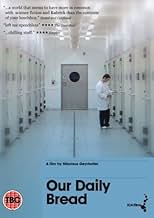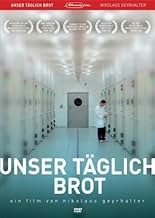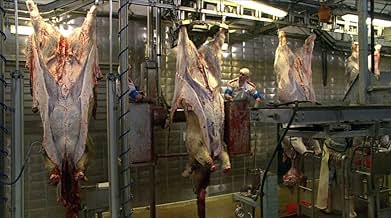AVALIAÇÃO DA IMDb
7,5/10
2,7 mil
SUA AVALIAÇÃO
Adicionar um enredo no seu idiomaOUR DAILY BREAD is a wide-screen tableau of a feast which isn't always easy to digest - and in which we all take part. A pure, meticulous and high-end film experience that enables the audien... Ler tudoOUR DAILY BREAD is a wide-screen tableau of a feast which isn't always easy to digest - and in which we all take part. A pure, meticulous and high-end film experience that enables the audience to form their own ideas.OUR DAILY BREAD is a wide-screen tableau of a feast which isn't always easy to digest - and in which we all take part. A pure, meticulous and high-end film experience that enables the audience to form their own ideas.
- Direção
- Roteiristas
- Artistas
- Prêmios
- 4 vitórias e 5 indicações no total
- Direção
- Roteiristas
- Elenco e equipe completos
- Produção, bilheteria e muito mais no IMDbPro
Avaliações em destaque
It is great. Not because of the subject or because I'm so interested in the food processing industry.(I'm really not) It is great because it ask and answer some really new things about documentary.
If not new,"different" in the best possible interpretation of the word. No talking, that means no interview or voice over. No editing tricks,just perfect efficient shots, one after the other. Forget the angry guy behind the camera or the microphone who really wants to not only show but persuade you. Forget the radio-documentary, here come the images-documentary. If you liked Depardon's documentary, if you like photography, if you are tired of Mickael Moore, if you don't think you need to be told what to think when you can just see it, there is a movie for you.
Its a lot more than a documentary about food industry as far as I'm concern, its about backing up and trying to get " a bigger picture"
MAc
If not new,"different" in the best possible interpretation of the word. No talking, that means no interview or voice over. No editing tricks,just perfect efficient shots, one after the other. Forget the angry guy behind the camera or the microphone who really wants to not only show but persuade you. Forget the radio-documentary, here come the images-documentary. If you liked Depardon's documentary, if you like photography, if you are tired of Mickael Moore, if you don't think you need to be told what to think when you can just see it, there is a movie for you.
Its a lot more than a documentary about food industry as far as I'm concern, its about backing up and trying to get " a bigger picture"
MAc
The quality of the this film, how it focuses on the various aspects of large and highly advanced agricultural processes used in Europe is very interesting and seems to include a great amount of detail in the various processes that result in the meat and vegetables that are destined to show up on people's dinner tables. From feeding beef cattle to harvesting Irish potatoes we get fine quality shots that include so much information both close-up and deep shots. Most of us are so distanced from how our food is produced. Most producers I would imagine don't really want to let us in on what goes on before the products shows up in our market showcase. The candidness of the images that show the operations where the food is grown and processed is great. I bet that few food producers in the U.S would allow such filming in the establishments
The movie is a stunning visual documentary of modern day food production. There is no dialog - just visuals (with sound).
The video is taken from food production facilities in Europe. With the growth of the worldwide population, it is fascinating to see how streamlined (and a bit "freaky") food production has become. It's almost like watching factory assembly lines punching out one "widget" after another.
Sometimes it's disturbing to watch because the "widgets" are live animals or carcasses. These scenes made me really think about population expansion - it's very unsettling to think about how much this type of food production will have to be escalated to feed the growing masses.
If you are intrigued by mass production processes of basic vegetable and meat food supplies, this is a great film to see. It's a visual diary of the processes involved.
The video is taken from food production facilities in Europe. With the growth of the worldwide population, it is fascinating to see how streamlined (and a bit "freaky") food production has become. It's almost like watching factory assembly lines punching out one "widget" after another.
Sometimes it's disturbing to watch because the "widgets" are live animals or carcasses. These scenes made me really think about population expansion - it's very unsettling to think about how much this type of food production will have to be escalated to feed the growing masses.
If you are intrigued by mass production processes of basic vegetable and meat food supplies, this is a great film to see. It's a visual diary of the processes involved.
This movie didn't show me anything I didn't already know, but it's silence gave me time to think about what is shown. Certainly not a movie for impatient people or after a hard day at work. It left me with a strong feeling: That industrial farming and breeding is just that - industrial. Certainly the slaughterhouse sequences touched me most. Treatment of the animals doesn't appear cruel, but very unnatural. Efficiency and detachment rule. Plants and animals don't grow and live anymore. They are produced and harvested. What's ultimately lost is the variety of life outside the human production-sphere and the human connection to the world.
if by artistic you mean concerned only with aesthetics, and beautiful camera work, and gorgeous film, and incredible color. i gotta take issue with saying that the documentary was cold and dispassionate and too concerned with art for art's sake. i would have to say not by the longest long shot. because....because the movie was equally as much about the people producing the food as it was about the production. and thats where much of the heart of the whole movie lies---you just don't notice it right away because there is no sound track, or you don't hear or understand the conversation between people. the isolation of the producers one from each other, for instance. the silence that they work in. those big ear muffs they wear. the deafening noise. the isolating self0-conscousness of being on camera, the movie maker implicating himself. (i definitely saw that a couple of times.) look at that first shot of the woman eating by herself with the mangled finger. an UNBELIEVABLY compassionate image. describing close to the entire world in thirty seconds. Or the next woman, taking her smoking break.
the voicelessness is about isolation. the workers, the animals, the act of filming. the "dumbness" of animals--their inability to speak--and that of the workers on many occasions--is what maybe the movie is all about. (and so the wordless narration is maybe an act of empathy with the animals?? I dunno for sure, but i could make a good argument i was going to write a paper.
and what about the shoeless guy in "The Dominator"?
AND... did notice how, when the ethnic workers are introduced, as opposed to the white northern working classes of Europe, when the immigrant populations are shown at work, the movie slightly changes?? The first and only shot of people at home, and talking in a group, and cooking at home (rice), are Africans. Refugees of wars, no doubt. For a long time in this film,m, I was wondering where the ethnic minorities who make up so much of Europes' working class had disappeared to. Suddenly, mid way, they show up. i don't think it's completely by accident. not completely. Then, later, the Arabic guys are shown taking there lunch break. they too, are eating and talking with each other. taking there break under a tree, close to the ground that they are harvesting from. these shots if anything rubbed me a little bit the wrong way, thinking a little bit of idealizing of the non-European "other" was going on. but the movie redeems itself on this front--or just proves me wrong--when we see a big table of white Europeans eating together. something is most definitely being said about tribalism, and about race, and consumption habits.
i could talk reams about how great this movie is--write a dissertation even like maybe Chris here--but that would totally ruin it. see the movie, its phenomenal. and disturbing..
the voicelessness is about isolation. the workers, the animals, the act of filming. the "dumbness" of animals--their inability to speak--and that of the workers on many occasions--is what maybe the movie is all about. (and so the wordless narration is maybe an act of empathy with the animals?? I dunno for sure, but i could make a good argument i was going to write a paper.
and what about the shoeless guy in "The Dominator"?
AND... did notice how, when the ethnic workers are introduced, as opposed to the white northern working classes of Europe, when the immigrant populations are shown at work, the movie slightly changes?? The first and only shot of people at home, and talking in a group, and cooking at home (rice), are Africans. Refugees of wars, no doubt. For a long time in this film,m, I was wondering where the ethnic minorities who make up so much of Europes' working class had disappeared to. Suddenly, mid way, they show up. i don't think it's completely by accident. not completely. Then, later, the Arabic guys are shown taking there lunch break. they too, are eating and talking with each other. taking there break under a tree, close to the ground that they are harvesting from. these shots if anything rubbed me a little bit the wrong way, thinking a little bit of idealizing of the non-European "other" was going on. but the movie redeems itself on this front--or just proves me wrong--when we see a big table of white Europeans eating together. something is most definitely being said about tribalism, and about race, and consumption habits.
i could talk reams about how great this movie is--write a dissertation even like maybe Chris here--but that would totally ruin it. see the movie, its phenomenal. and disturbing..
Você sabia?
- ConexõesReferenced in Film Junk Podcast: Episode 232: Inglourious Basterds (2009)
Principais escolhas
Faça login para avaliar e ver a lista de recomendações personalizadas
Detalhes
Bilheteria
- Faturamento bruto mundial
- US$ 71.810
- Tempo de duração
- 1 h 32 min(92 min)
- Cor
- Mixagem de som
- Proporção
- 1.85 : 1
Contribua para esta página
Sugerir uma alteração ou adicionar conteúdo ausente








